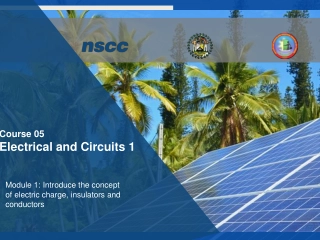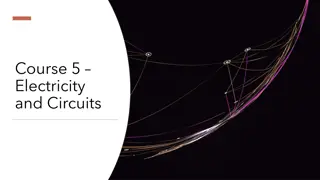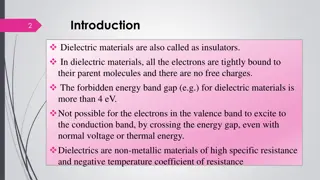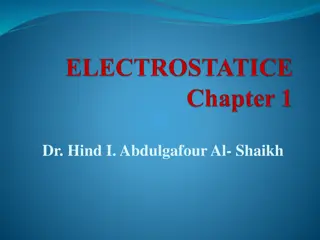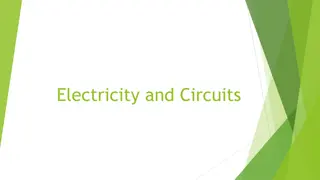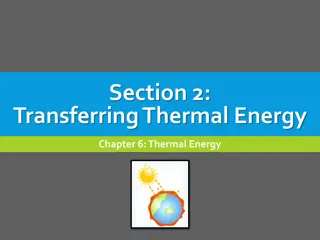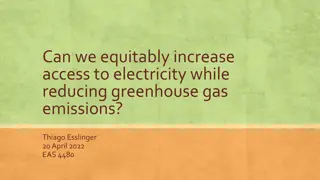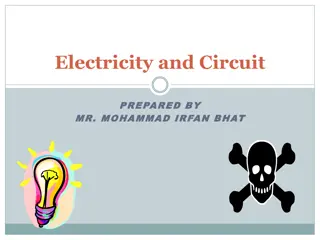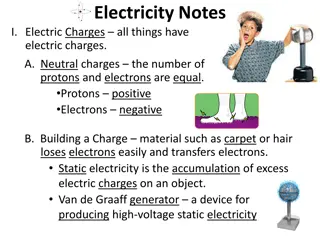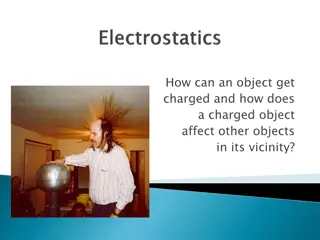Understanding Electricity: Conductors, Insulators, and Current
Electricity is essential for modern life, with conductors allowing electron flow and insulators preventing it. Learn about the basics of atoms, electrons, and how electricity works through conductors and insulators. Discover the role of current and how electrons behave in different materials, drawing parallels between electrical systems and water systems for better understanding.
Download Presentation

Please find below an Image/Link to download the presentation.
The content on the website is provided AS IS for your information and personal use only. It may not be sold, licensed, or shared on other websites without obtaining consent from the author. Download presentation by click this link. If you encounter any issues during the download, it is possible that the publisher has removed the file from their server.
E N D
Presentation Transcript
Electricity HOW WOULD YOUR LIFE BE DIFFERENT WITH NO ELECTRICITY?
A power outage has just happened in your city Question: What actions from your daily life would not be possible without electricity?
Topic Preview Electricity Conductors Insulators Current Static charge
What Are Atoms? The basic unit of all elements of matter Made of electrons, protons and neutrons The nucleus of an atom is in the center, which is where the protons and neutrons are located - - + - ++ + -
What Are Electrons (e-)? - proton (+) - + - ++ + - electron (-) Have a negative electric charge Are attracted to protons
Electricity is the presence or flow of electrons
Conductors Materials in which electricity (electrons) can easily flow When current is applied, electrons move in the same direction Metals make good conductors
Example: Copper Conducts electricity
Insulators A material in which electricity can not easily flow Glass, wood and rubber make good insulators Often used for safety purposes, such as covering electrical wires
Example: Rubber A good insulator and a poor conductor
Electrons travel easily through conductors and poorly through insulators conductor freely move electrons insulator hold onto their electrons
Current Similarities between water and electrical systems We often use well-known systems to better understand more complex systems. Hoover Dam Nile River Electrons act like water molecules in that they can flow like rivers or collect in dams.
Current In water systems, current is the flow of water. e- e- e- e- e- In electrical systems, current is the flow of electrons. e- e- e-
Static Charge Dammed water collects, but cannot flow Static charge, or static electricity, collects charge, but cannot flow
Static Charge Think positive (+) and negative (+) Objects may gain or lose electrons (-). Rubbing the balloon on hair causes more electrons(-) to go onto the balloon from the hair. neutral (0) neutral (0) The hair loses electrons, thus becoming positively charged (+). The balloon becomes negatively charged (-) net negative charge (-) net positive charge (+)
Review Questions Do you think electrical current flows more easily in conductors or insulators? Electrical current flows more easily in conductors because electrons move better in conductors. Static electricity builds up more easily in insulators because electrons cannot move well in insulators.
Review Questions What do we call the flow of charged particles? Electricity! Does it matter if they are a positive or negative? No, but typically electricity is the flow of electrons (negative charge)
Review Questions We have shown that copper is a conductor. Name three more conductors. Gold, silver, aluminum Where would an electrician use an insulator? What type of material would it be? Why would an electrician use an insulator? An electrician would use insulator material either around electrical wires or around the handles of the electrician s tools. Usually, electricians use rubber. Insulators help to protect the electrician because current does not travel very well through insulators.
Review Questions If you wanted to design an electrical system that stored static electricity, would you use a conductor or an insulator? Why? To build an static electricity storage system, you would want to use an insulator, because insulators reduce electron flow. Finish the analogy: River IS TO water molecules AS wire is to ___________ electrons


